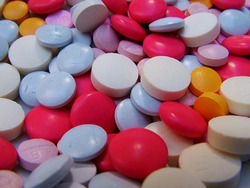|
As a freelance writer, I have had many interesting opportunities that have expanded my horizons and interests. During the time I spent blogging for a natural supplement company, I learned a great deal about the pharmaceutical and nutritional supplement industries. Lately, I have seen a lot of misleading information floating around social media, so I wanted to share some of the knowledge I gained and what I took away from that industry.

For example, did you know that the pharmaceutical industry spends more money on advertising for products than on research and development?[i] This trend has altered pharmaceutical industry and medical community as a whole. The increased amount of advertising in mass and print media has altered the routine from a doctor prescribing a medicine fit for a condition, to the patient asking for a specific medication.
The concern then shifts from determining if the treatment is being offered as “evidence-based science rather than evidence-based marketing”.[ii] Medical professionals even admit that they are caught up in the money making aspect of pharmaceuticals, often receiving incentives when offering certain medications, even when they might not be the best-suited treatment. The Hippocratic Oath promises “prevent disease whenever… for prevention is preferable to cure”. Unfortunately the main goal of the pharmaceutical industry is based in profit margins and not the improved health of humanity. This creates quite the discrepancy between the goals of the pharmaceutical industry and the individuals who are in charge of getting these medications to the public. Doctors often prescribe a medication to a patient with the knowledge that it become a life-long medication vital to daily existence instead of seeking out alternative treatment options. One of the biggest health concerns in the pharmaceutical industry is the enormous amount of side effects from using medications. While speaking at a conference in Germany, retired Eli Lilly & Co. executive Dr. John Virapen describes the pharmaceutical industry as doing “nothing but annihilate the population of this world… because they want to make money, money, money, money, money”. He reveals the industry mindset that their customers “are not sick people”, moreover that they are viewed as “consumers and the pharma[ceutical] industry makes money because they tell everybody that ‘you are sick’”. He reminds his audience “they don’t care about your lives; they care about their wallets” which is apparent when you consider that the pharmaceutical industry had the highest profit margin of the five main industrial sectors in 2013. Though it is illegal to provide incentives for doctors to write certain prescriptions, it is permissible to “give money to doctors to help promote your drug”.[iii] A recent study found that doctors in the United States are twice as likely to prescribe their patients medicines when they are receiving payment from pharmaceutical companies.[iv] However, there are doctors and pharmacists who have become more vocal regarding the dangers within their industry and have increased their recommendations towards alternative methods of health care management. Think about the immense responsibility a doctor owes to their patient; the Hippocratic Oath states, “I will apply, for the benefit of the sick, all measures which are required…” Depending on the situation, it might look like physical or occupational therapy, prescription drugs, or vitamins and nutritional supplements to help improve a patient’s well being. Increasingly more and more doctors are recommending natural supplements over prescription medications.[v] Nearly 75% of doctors recommend that their patients take nutritional supplements to improve their health.[vi] Pharmacist Dustin Randolph touts the idea of lifestyle medicine in his book, The Empty Medicine Cabinet: The Pharmacist's Guide to the Hidden Danger of Drugs and the Healing Powers of Food instead of medications remind you “your key to success comes in the form of a grocery list and not a prescription”. The interest in pharmacognosy, or the study of drugs from natural sources, has elicited a discussion within the medical community. In her latest book, Food Over Medicine, Pamela Popper, PhD, ND urges the consumer to take charge of their own health decisions and ultimately cautions, “people really need to rethink the money they spend on supplements and the potential damage to their health the supplements can cause”. There are two crucial concerns in the nutritional supplement industry that Dr. Popper is alluding to: ingredient purity and industry regulation. A study published in the New York Times finds supplements that contain diluted ingredients or do not contain the ingredients as listed on the label.[vii] The other major issue is the lack of oversight across the supplement industry and which government agency is responsible for the regulation of the manufacturing and advertising. Ingredient purity has a major concern in the news lately, as the industry does not regulate the manufacturing of nutritional supplements. Even though there are federal regulatory agencies such as the Food and Drug Administration (FDA) and the Federal Trade Commission (FTC), the responsibility of which department should monitor nutritional supplements is blurred. The FTC states that they work jointly with the FDA, but that the FDA is primarily responsible for “claims on product labeling, including packaging, inserts”. Meanwhile, the FDA claims that “the manufacturer is responsible for ensuring the accuracy and truthfulness of these claims; they are not approved by FDA”. It would appear that there is a bit of a discrepancy between how these issues are handled, which leaves room for major safety concerns. The New York Times reports that supplements often do not contain the item they are labeled as, finding that nearly one-third of supplements tested showed zero trace of at least one of the ingredients indicated on the label. If the product listed isn’t what is in your supplement, then what is? Often supplements contain fillers that are not listed on the label in order to cut corners. Subsequently, since none of these items are regulated, there could be any number of hazards involved with these mystery ingredients, from dangerous levels of mold or toxins, to potentially lethal allergens. Manufactures and distributors of dietary supplements are not required to “tell FDA or consumers what evidence they have about their product's safety or what evidence they have to back up the claims they are making for them”. The FDA has provided no regulations for merchants to “disclose to FDA or consumers the information they have about the safety or purported benefits of their dietary supplement products”. An article in the New England Journal of Medicine describes this problem as our “woefully inadequate system for monitoring supplement safety”.[viii] Even on one of the few pages that the FDA has dedicated to the safety of supplement users, the disclaimer reminds you that the 500+ items listed are only a small fraction of the potentially lethal products available.[ix] Some suppliers provide a Certificate of Authenticity with their product to prove the genuine nature of the raw materials used in their ingredients. The certificate attests to the manner in which the authenticity of the item is confirmed and allows peace of mind that raw materials are sourced appropriately. Companies have to self-regulate since there is not a standard used across the industry and thorough inspection is the only way to ensure the safety and quality of nutritional supplements. One of the more common methods used is the current Good Manufacturing Practice (cGMP) certification obtained through arduous examination per the International Society for Pharmaceutical Engineering (ISPE).[x] The cGMP certification process includes all aspects of production from testing the quality of materials used, to inspecting the cleanliness of the manufacturing facilities and equipment used, and even assessing the training and personal hygiene of the employees. Another widely recognized certification is from the National Sanitation Foundation (NSF) whereby doctors, scientists, and public health officials develop uniform standards for industry protocols. In 2003, NSF created the first American National Standard for dietary supplements. In order to have an NSF certification, a product must be evaluated in a laboratory setting, in addition to consenting to regular inspection of the manufacturing facilities including product sampling and confirmation. Findings then have to be reviewed and approved by a panel before a contract can be signed and the product can bear the prestigious NSF label.[xi] So what is the bottom line? Be diligent about the choices you make as a consumer and what you choose to put into your body. Just because your doctor, a friend, a store clerk has recommended any product, it is up to you to do your own research before you ingest anything. Your body knows instinctively what it needs and what is best for it, so if you ask it, and take the time to listen, your body will tell you what it needs. Love and Light, xo Arielle Sterling Looking for more info? Check out the resources I used below: [i] http://www.bbc.com/news/business-28212223 [ii] http://www.cbsnews.com/news/does-your-doc-have-ties-to-big-pharma-how-youll-be-able-to-find-out/ [iii] http://www.business.ftc.gov/documents/bus09-dietary-supplements-advertising-guide-industry [iv] http://www.huffingtonpost.com/dr-peter-rost/dont-trust-your-doctor_b_18977.html [v]http://www.prevention.com/health/healthy-living/more-doctors-prescribing-herbal-supplements-and-natural-remedies [vi] http://www.mpamedia.com/market_research/dcpi_nutritional_supplement_survey.pdf [vii]http://www.nytimes.com/2013/11/05/science/herbal-supplements-are-often-not-what-they-seem.html?pagewanted=all&module=Search&mabReward=relbias%3Ar%2C%7B%222%22%3A%22RI%3A15%22%7D&_r=2& [viii] http://www.nejm.org/doi/full/10.1056/NEJMp1315559 [ix]http://www.accessdata.fda.gov/scripts/sda/sdNavigation.cfm?filter=&sortColumn=1d&sd=tainted_supplements_cder&page=1 [x] http://www.ispe.org/index.php?ci_id=2670 [xi] http://www.nsf.org/regulatory/regulator-nsf-certification/ P.S. Wanting to keep up to date with my latest blogs and offerings? Subscribe to my mailing list and receive a FREE Chakra Sound Bath as my gift to you!
0 Comments
Leave a Reply. |
Arielle SterlingArielle is a best-selling author, holistic life coach and intuitive energy healer. Archives
July 2024
Categories
All
|


 RSS Feed
RSS Feed